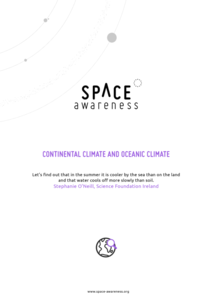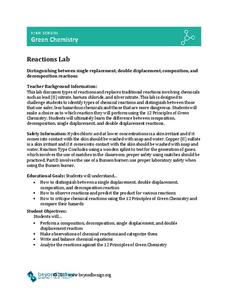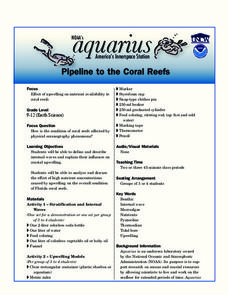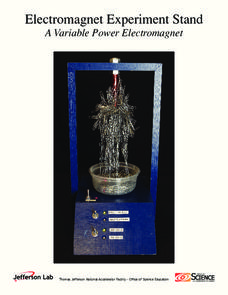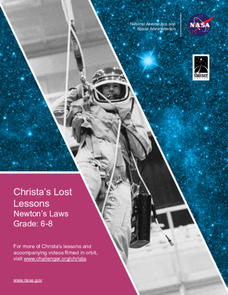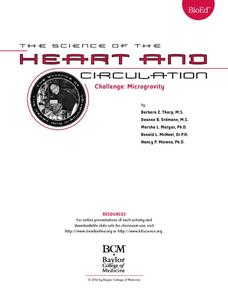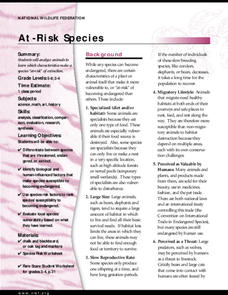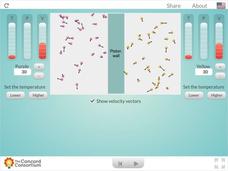Space Awareness
Continental Climate and Oceanic Climate
There's nothing better than a cool breeze blowing in from the ocean. Scholars explore how water affects change in temperature using a hands-on experiment on climate. They use measurement tools to compare the continental and oceanic...
University of North Carolina
Sciences
Science writing follows many of the same principles as writing in language arts, but some structural details differ. Individuals read an online science handout that covers how to write with precision, choose appropriate details, and use...
NASA
Determining the Nature, Size, and Age of the Universe
Prompt scholars to discover the expansion of the universe themselves. Using photographs of other galaxies, they measure and then graph the size and distance of each. Finally, they draw conclusions and prove the universe is expanding.
Learning Games Lab
The Magic of Reading Graphs
Making conclusions from graphs doesn't need to seem like magic. Learners explore an interactive lesson on reading graphs to strengthen their skills. The content discusses how to read the axes of a graph and draw conclusions based on the...
Beyond Benign
Reactions Lab
You're bound to get a reaction from your classes with this experiment! Scholars perform several chemical reactions, make observations, and classify the reactions as single replacement, double replacement, composition, or decomposition...
Chemistry Collective
Virtual Lab: Determining Stoichiometric Coefficients
Investigate the reaction between four unknown substances using a virtual activity. Eager chemists examine the reaction between the four solutions to build a stoichiometric equation. The virtual workbench provides the tools necessary to...
PHET
Mapping the Field of Multiple Dipole Magnets
So you built a magnetometer, now what? High school scientists use their magnetometer made in a previous lesson to map the union of magnetic fields of dipole magnets. They experiment with different alignments and draw conclusions about...
Florida International University
Pipeline to the Coral Reefs
Discover firsthand the effects of internal waves on coral reefs. Through a series of experiments, learners simulate internal waves and upwelling events as they make observations on the movement of water and other debris. They then...
US Department of Energy
Electromagnet Experiment Stand: A Variable Power Electromagnet
Electromagnets come in both large and small scales—from big machinery in scrap yards to hard disk drives. Here's a resource that provides directions for building a variable electromagnet on a stand. Scholars then experiment with the...
NASA
Christa's Lost Lesson: Newton’s Laws
How do the laws of motion work in space? Learners explore Newton's laws of motion in different experiments as part of the Christa's Lost Lessons series. They rotate around the room in three stations to experience each law in action using...
Curated OER
Earthquakes: Sixth Grade Lesson Plans and Activities
Young seismologists learn more about plate tectonics with a set of pre-lab, lab, and post-lab lessons plans on earthquakes. After exploring how waves travel through various materials, sixth graders record their observations and draw...
Serendip
The Molecular Biology of Mutations and Muscular Dystrophy
Different types of mutations cause unique types and degrees of muscular dystrophy. Scholars learn about the types of mutations and the impact on the body. They compare the location of the mutations and draw conclusions about how it is...
Serendip
Evolution and Adaptations
Survival of the fittest isn't just for the movies! A five-part lesson explores several different species with known adaptations and analyzes them for their survival strategies. Using both video and research data, scholars draw...
Discovery Education
School of Rock
Why do rocks break down over time? Learners explore this concept by simulating physical and chemical weathering of different types of rocks. They use an abrasive to demonstrate physical weathering and acid to demonstrate chemical...
Science 4 Inquiry
Trick or Science: Catching the Light
Your class might be surprised to learn that mirrors have been around since the first century AD! Young scientists explore reflection and refraction of light through a series of challenges. They use this knowledge to design their own...
Curated OER
Ornithology and Real World Science
Double click that mouse because you just found an amazing lesson! This cross-curricular Ornithology lesson incorporates literature, writing, reading informational text, data collection, scientific inquiry, Internet research, art, and...
Baylor College
Challenge: Microgravity
What a festive way to examine what happens to the heart in different gravitational situations! Small groups place a water-filled balloon in different locations (on a table top, in a tub of water, and held in a vertical position), drawing...
National History Day
Helping Life and Aiding Death: Science, Technology, and Engineering at Work during World War I
Science, engineering, and United States history? Pupils research collections of artifacts from the Smithsonian to learn about historical scientific innovations. At the end of the lesson, they write an essay to discuss technology's...
Curated OER
Discovering Language Arts-Intermediate Fiction
Explore the elements of science fiction. Students investigate the literary elements present in science fiction and write their own science fiction stories.
National Wildlife Federation
At-Risk Species
Certain behaviors make species vulnerable to extinction and others protect them. By studying species that are currently endangered, learners draw conclusions about these behaviors. They then apply their conclusions to healthy species and...
Howard Hughes Medical Institute
Classroom Activities: Pedigree Analysis Activity
Trace a genetic trait through an entire pedigree. A class activity provides pupils with an opportunity to explore a pedigree tree displaying a specific trait. They draw conclusions from the display and provide recommendations based on...
NASA
Ripening of Fruits and Vegetables
How long do fresh foods last in space at the International Space Station? Which foods perish quicker than others? How can astronauts preserve their foods to make them last longer in space? Young scientists test the rates at which some...
Concord Consortium
Pressure Equilibrium
All together now! Physical science pupils observe the effects of temperature and amount of substance on pressure and volume of a gas. The interactive resource guides learners through the Combined Gas Law, where they observe changing...
American Museum of Natural History
What's the Big Deal About Paleontology?
Paleontologists could be considered detectives of the past. A quick online lesson describes the science of paleontology and the importance of fossils. Young scientists read about how paleontologists analyze the features of fossils to...


